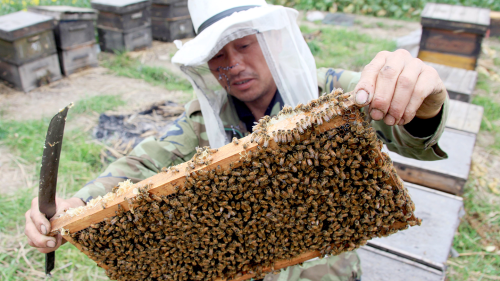Honey Trap, Plant-Based Workout, and Climate Financing
Check out our roundup of the week's top news and research in food, agriculture, and global development.

Top Story
Ukrainian Grain Glut
Massive imports of cheaper Ukrainian grain are putting local farmers at risk, inspiring import restrictions in Bulgaria, Hungary, Poland, Romania, and Slovakia. The European Commission denounced the restrictions, and is now working on new funding for an EU-wide farmer support package. However, negotiations are still ongoing, leaving farmers without aid and triggering demands for compensation for prices of grain products. Without quick action, the bans could potentially drive up global food prices once again.
Council Insights
Joining the Ranks
A new nonresident fellow is joining the Chicago Council on Global Affairs’ Center on Global Food and Agriculture: Dr. Priya Fielding-Singh! Dr. Fielding-Singh is a sociologist and assistant professor in the Department of Family and Consumer Studies at the University of Utah. Her research and writing examine issues of social, economic, and racial justice, with a focus on food and nutrition equity alongside maternal and child health. Learn more about her below.


Food & Agriculture
Honey Trap
A group of 20 European Union countries, led by Slovenia, are pushing for tighter regulation against "honey laundering" as the bloc's market is flooded with syrup-laced honey from China and other exporters. A recent European Commission study found that almost half of the honey surveyed broke EU rules, with banned ingredients such as sugar syrups, dyes, and water, all of which drive down honey prices. The 20 member states have called for new rules on honey labeling and strengthening checks to make detecting fraudulent samples easier.
Surging Prices
Spain’s severe drought has led to a surge in olive oil prices to record levels, with prices up almost 60 percent since June. Spain typically produces half of the world's olive oil, but annual supplies have roughly halved to about 780,000 tons in the past 12 months. Analysts warn that another dry summer could lead to even lower crop yields later this year, which could keep prices elevated and lead to poorer quality olive oil.
Corn Smugglers
Corn prices in the Democratic Republic of Congo (DRC) have surged due to the lean season, leading to smuggling from neighboring Zambia, where the same bag of cornmeal costs around $10 compared to $44 in the DRC. Smugglers are hiding cornmeal creatively, including among crushed stones, sand, caskets, and even in bags of sugar. Zambia has deployed security personnel to curb smuggling, while retailers have limited the amount of cornmeal customers can buy.
Deeper Dive
Spain's Drought Worsens
Spain is seeking emergency aid from the European Union to support its farmers as the nation faces severe drought conditions in its agricultural heartlands. The country is already struggling with five consecutive years of drought, which has severely impacted olive oil, wheat, and barley, with farmers in the Catalonia region also fighting a plague of rabbits and are struggling to keep crops alive.
Resilience
Climate Financing
President Biden announced a $500 million investment in the Amazon Fund to help protect the Amazon rainforest from deforestation. The $500 million will be delivered over five years, making the United States one of the world's largest donors to the international conservation program. Biden also promised a $1 billion contribution to the Green Climate Fund, the primary climate financing mechanism of the United Nations.
DC Report
SNAP Faces Cuts
House Republicans have proposed to expand work requirements for the Supplemental Nutrition Assistance Program (SNAP), which could impact almost one million people. The proposed plan includes requiring adults aged 18 to 56 without disabilities or dependents to work or participate in job training programs for at least 20 hours a week to receive SNAP benefits for more than three months. The plan is part of a proposal to cut federal spending and raise the debt ceiling, which has little chance of passing the Democratic Senate and would be vetoed by President Biden if it reaches his desk.
Big Actors
Military Food Insecurity
The US Department of Defense launched the Basic Needs Allowance to provide financial support to military families facing food insecurity. However, there is criticism that the measure is insufficient, with Senators Kirsten Gillibrand and Elizabeth Warren proposing an increase to eligible families' income by 150 percent of the federal poverty guidelines. In response, Defense Secretary Lloyd Austin announced during a Senate Armed Services Committee hearing that the increase would be implemented in July.
Big Ideas
A Plant-Based Workout
Lululemon aims to replace most of its oil-based nylon products with plant-based versions by 2030 as part of its effort to become completely sustainable. The company launched two shirts, with at least 50 percent of the nylon made from plant-based sugars and the rest consisting of recycled polyester and elastane. This move is part of the industry's efforts to address its environmental footprint, with the fashion industry accounting for eight to 10 percent of global greenhouse gas emissions.
Ask an Expert
What excites you about joining the Chicago Council as a nonresident fellow?
“Joining the Council as a nonresident fellow offers an unparalleled opportunity to connect with others working at the critical intersection of agriculture, nutrition, and health. I’m excited to engage with and learn from other scholars, practitioners, and leaders in this space.”
— Nonresident Fellow Priya Fielding-Singh


Have a question about food and agriculture? Ask one of our experts at the Center on Global Food and Agriculture to get an answer in next week's Global Food for Thought!
Council Events
Did you miss one of our previous livestreams? Don't worry! They are all available on our website to watch at any time.
Other Upcoming Events
Falmouth Art Center Book Club – Farming While Black Virtual Talk with Leah Penniman
Date: May 4
Time: 4:00 – 5:00 p.m. ET
Green and Growing Summit
Date: May 6
Time: 8:00 a.m. - 3:30 p.m. CT
AIM for Climate Summit
Date: May 8 - 10
SPIR II Learning Event
Date: May 16 - 17
IFAD Innovation Day
Date: June 28
Time: 7:00 a.m. GMT
Land Acknowledgement Statement
The Center on Global Food and Agriculture recognizes it occupies the ancestral land of the Kiikaapoi, Peoria, Kaskaskia, Bodwéwadmi, and Myaamia people. Indigenous communities around the world disproportionately experience the pressures of climate change, global conflicts, and the COVID-19 pandemic, while simultaneously stewarding 80 percent of the world’s biodiversity. These Indigenous tribes and nations are the original owners of this land and continue to be systemically erased by policies and practices that ignore their histories. To learn more about Indigenous foodways and practices, check out our 2022 blog series "Stewardship, Sovereignty, and Solutions."
Related Content
- Embracing Dandelions as Food and Medicine
- Going Beyond Regenerative Agriculture on Tribal Lands
- Expanding "638" to Enhance Native American Food Sovereignty
- Flavors and Culture: Food Systems Through Indigenous Women's Eyes
- A Thanksgiving Legacy: Fighting for Indigenous Food Sovereignty
- Native Food Sovereignty: Strengthening Connection to Culture
- Reconnecting to Indigenous Food Sovereignty Values and Practices
- Embracing Interconnectedness: How Indigenous Foodways Can Save Us




